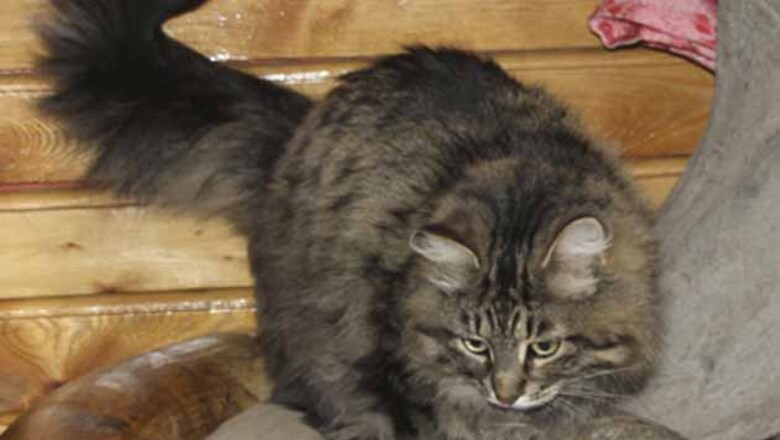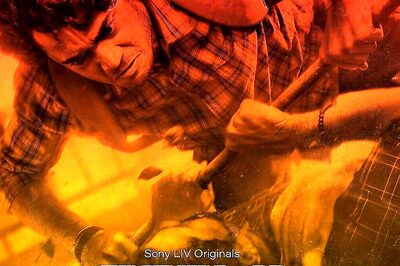
views
Tokyo: Homer started out with a lot against him. Abandoned as a tiny kitten, a virulent infection meant he had to have both eyes removed to save his life.
His fortunes changed when he was taken home by Gwen Cooper, an avid cat lover who was instantly charmed by the kitten's energy and enthusiasm for life despite his problems. She christened him "Homer" for the blind Greek poet who wrote epic poems such as "The Odyssey."
As the sleek black feline grew from impetuous kitten into energetic cat, leaping around her apartment and rarely falling despite not being able to see, Cooper found her thinking changing. Eventually she wrote a book, "Homer's Odyssey," about what Homer taught her about trust, love and taking risks.
In Homer's case, this included leaping five feet into the air to capture flies and once scaring off an intruder who had broken into Cooper's apartment.
"I was living with a cat who was not supposed to be able to live a normal life and was not supposed to be able to do things that other cats do. No one ever told him that he couldn't do these things, so he just went ahead and did them," Cooper said in a phone interview from her home in New York.
"I talk a lot in the book about blind leaps of faith. There are some things in life that are really worth getting that you're not going to get unless you take that leap and tell yourself that no one else can tell you what your potential is."
Deciding to move into writing as a full-time career was one of the leaps that Cooper took, first with a novel and then with the book about Homer, who so charmed all who met him that one of the plaints of boyfriends she broke up with was: "You mean I won't be able to see Homer anymore?"
Cooper confessed to a bit of surprise at the success of her book, which has hit the New York Times bestseller list in both hardcover and as the recently issued paperback, but admits that she may have accidentally hit it lucky by bringing the book out in economically challenging times.
"When I started working on the book, the world was a great place. It was only a couple of months before I finished the manuscript that things started falling apart," she said.
"I do think that it does strike a chord about perseverance and about carrying through tough times that might not have been as resonant if things were as good as they were a couple of years ago. But I don't really know."
This popularity, which has resulted in a deluge of cat toys, blankets and other presents for Homer and Cooper's other cat, has also begun to change how Cooper, long a volunteer for animals and other causes, views her relationship with Homer, now a spry 14.
"We've sort of entered a different phase where Homer is kind of the world's cat," Cooper said.
"I now think of Homer more in terms of what he can do for other cats like him, who may be having a hard time finding homes or being euthanized in shelters because they're not 'perfect....' I see he has potential to do a great deal of good." started out with a lot against him. Abandoned as a tiny kitten, a virulent infection meant he had to have both eyes removed to save his life.
His fortunes changed when he was taken home by Gwen Cooper, an avid cat lover who was instantly charmed by the kitten's energy and enthusiasm for life despite his problems. She christened him "Homer" for the blind Greek poet who wrote epic poems such as "The Odyssey."
As the sleek black feline grew from impetuous kitten into energetic cat, leaping around her apartment and rarely falling despite not being able to see, Cooper found her thinking changing. Eventually she wrote a book, "Homer's Odyssey," about what Homer taught her about trust, love and taking risks.
In Homer's case, this included leaping five feet into the air to capture flies and once scaring off an intruder who had broken into Cooper's apartment.
"I was living with a cat who was not supposed to be able to live a normal life and was not supposed to be able to do things that other cats do. No one ever told him that he couldn't do these things, so he just went ahead and did them," Cooper said in a phone interview from her home in New York.
"I talk a lot in the book about blind leaps of faith. There are some things in life that are really worth getting that you're not going to get unless you take that leap and tell yourself that no one else can tell you what your potential is."
Deciding to move into writing as a full-time career was one of the leaps that Cooper took, first with a novel and then with the book about Homer, who so charmed all who met him that one of the plaints of boyfriends she broke up with was: "You mean I won't be able to see Homer anymore?"
Cooper confessed to a bit of surprise at the success of her book, which has hit the New York Times bestseller list in both hardcover and as the recently issued paperback, but admits that she may have accidentally hit it lucky by bringing the book out in economically challenging times.
"When I started working on the book, the world was a great place. It was only a couple of months before I finished the manuscript that things started falling apart," she said.
"I do think that it does strike a chord about perseverance and about carrying through tough times that might not have been as resonant if things were as good as they were a couple of years ago. But I don't really know."
This popularity, which has resulted in a deluge of cat toys, blankets and other presents for Homer and Cooper's other cat, has also begun to change how Cooper, long a volunteer for animals and other causes, views her relationship with Homer, now a spry 14.
"We've sort of entered a different phase where Homer is kind of the world's cat," Cooper said.
"I now think of Homer more in terms of what he can do for other cats like him, who may be having a hard time finding homes or being euthanized in shelters because they're not 'perfect....' I see he has potential to do a great deal of good."




















Comments
0 comment